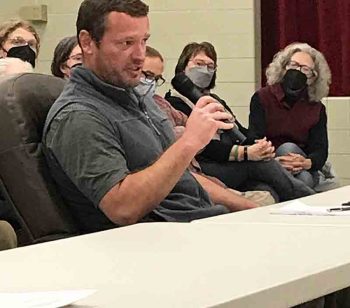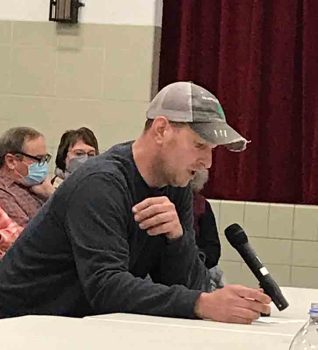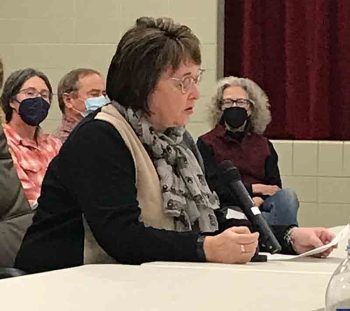
Photo by Wanda Hanson
March 1, 2022, around 80 citizens of Harmony had the opportunity to share their views on a proposed retail variety store ordinance with the city council at a special hearing.
The hearing began with Greg Schieber, city lawyer and EDA member briefly recounting the recent history of the proposed ordinance. Harmony EDA first discussed last fall whether a variety store such as Dollar General had a place in the community. Their concern was what would happen to essential business in the community such as the grocery store and the pharmacy.
Schieber stressed that communities do have power through zoning. Through an ordinance, the city could place retail variety stores under a conditional zoning.
The ordinance would have three parts: it would define what the ordinance affects and what isn’t affected; give background reasoning behind the ordinance, and set reasonable standards.
Schieber noted that not much attention has been given to the city’s zoning ordinance standards since they were written in the 1970s. He emphasized that this was a first draft for discussion.
Mayor Steve Donney opened the hearing, cautioning that each speaker was limited to 1½ minutes.
In total, 20 citizens addressed the council. Becky Hoff, a small business owner, urged the council to be proactive against big box companies; she suggested that they not allow companies traded on the New York Stock Exchange open businesses in Harmony. She felt this would level the playing field for small businesses.
Erica Thilges, manager of New Generations of Harmony, referenced a plan from 1997 that had the goal of protecting and preserving existing businesses; she urged the updating of planning and zoning with this proposed ordinance.

Photo by Wanda Hanson
Bonita Underbakke compared the prospect of a retail variety store such as Dollar General to that of an “invasive species” with no natural predators. She was concerned that such a store’s loyalty is to the CEO and not the community.
Harvey Benson, a 91-year-old resident of Harmony, urged acceptance of the ordinance and asked, “Do you have a will? Have you updated it? Times change — ordinances need to be updated just like your will. The only thing constant that we have is change.”
Aaron Bishop declared that conditional use ordinances are not a new concept — Harmony already has such ordinances regulating liquor sales as well as others.
Annette Evenson urged adoption and pointed out that the rule of dollars circulating in a community fails when outside corporations come in and “siphon local dollars away.”

Photo by Wanda Hanson
Dick Nethercut agreed, saying Harmony’s businesses go up and down, but the playing field has always been level. “It wouldn’t be with Dollar General; they instantly send daily profits to corporate,” Nethercut declared as he called it a “predatory business.”
Nate Osmonson referred to online shopping that also affects businesses in town. He asked the council to let the Dollar Store build, “Don’t deter any business from coming to town. Many buildings are empty in Harmony. Don’t let them fall into disrepair!” He declared he had a “profound faith in our community” that they would continue to support local businesses.
Dennis Dekeyrel, resident since 2004, opined, “This is not contrary to free enterprise. Losing a grocery store or pharmacy would be a big blow to seniors.” He felt it was not a discriminatory practice if the community had a clearly stated ordinance.
Jerry Grehl, who moved to Harmony in 2007 from Pennsylvania, spoke in favor of the Dollar Store. He agreed with the fact that the building would not be an architecturally pleasing building, but that it would be utilitarian. Countering the argument that the store would “ruin downtown’s atmosphere,” Grehl declared, “It’s a ghost town now!” After audience applause, Grehl ended, “It would be a good plus if we get it!”

Photo by Wanda Hanson
Ralph Beastrom told the council he too had moved to Harmony and had chosen the town for its character. He commended the EDA for their work, but was disappointed in the short time frame. Beastrom felt they needed more time to explore the situation.
Rich Bishop commented that he thought this was resolved 8 or 10 years ago when a similar store was coming to town. He asked why such an ordinance was not put into place at that time and urged acceptance now.
Andrew Kingsley stated, “This is a private sale between two parties; it’s not the government’s business. The local bank wants the community to succeed as well.” He pointed out that there are other chains in Harmony. “Harmony has a long history of consumer loyalty,” he noted as he ended.
Tim Little disagreed with Kingsley; he pointed out that the city government was the people and should have some say in the matter — not just the corporations.
Jacob Stauffer, developer for Dollar General, addressed the hearing, pointing out that any lot currently zoned commercial has been that for years. “You’re sending a message that you’d rather have an empty building in town than have our business.” He went on, “It’s not without risk to do a comprehensive plan now.”
When a council member asked Stauffer why Dollar General wanted to come to Harmony, he noted that the nearest Walmarts are over a half hour away. He declared, “Dollar General is not going to fail!” As he noted that they have built about 1,200 stores and he wasn’t aware of a single one failing. He ended, “We try to be good neighbors and partners.”
Mayor Donney commented as he closed the hearing that he had a lot of people contact him with both views, some in favor and some opposed. He declared, “Harmony will survive and be strong! We decide which businesses succeed and which die by where we shop.”
While the council could have voted on the ordinance after the hearing, they decided to take more time to think about it. The current moratorium is in effect until March 10. The council will wait until their next meeting (March 8, 2022, at 7 p.m.) to vote on the ordinance.


Annette Evenson says
Just a FYI
My quote below my photo is not exact. I would appreciate being quoted correctly when you choose to use my photo in your newspaper.
My exact quote you mentioned incorrectly
was thie following:
“There is a caveat here that is very important to recognize.”
“The rule of circulating dollars in communities BREAKS DOWN when a business isn’t locally owned and operated.” (End quote.)
May be a similar meaning but you absolutely did not quote what I said.
Get it right please, FCJ
Annette Evenson